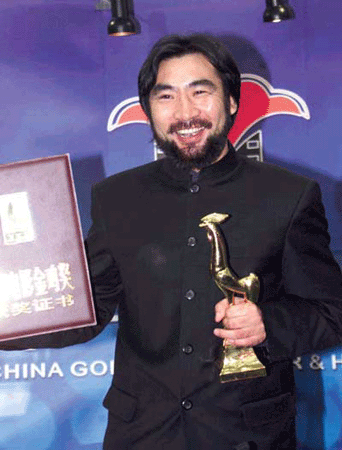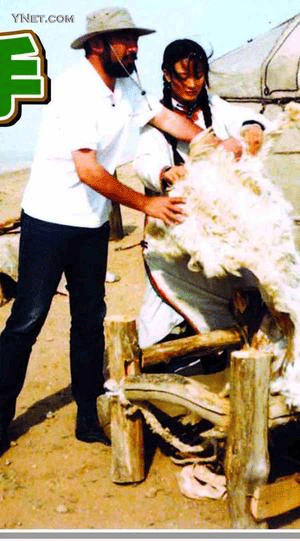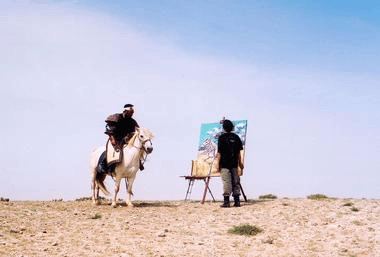| |
South China Morning Post
April 24, 2005
 |
|
|
Ethnic
Mongolian director Ning Cai (Xin Hua News)
|
|
Byline:
Actor-turned-director Ning Cai hopes his latest film will draw
the government's attention to the plight of Mongolia's horsemen,
writes Richard James Havis.
A
thoughtful study of a Mongolian horseman dealing with the
problems of modernisation, Season of the Horse is the kind of
small-scale film that doesn't come along often. Made at the
Inner Mongolia Film Studios by award -winning mainland actor
Ning Cai, it's touching without being sentimental, exotic
without insulting its characters, and socially aware without
being polemical.
Despite its obscure-sounding subject matter, it's a warm and
moving film that succeeds on just about every level - probably
because its director had more than just a pay cheque at stake.
Although Season of the Horse can be enjoyed purely as
entertainment, the Mongolian-born Ning made the film to draw
international attention to the suffering of his countrymen.
Ning's story revolves around the problems facing nomadic
Mongolian horsemen because of the Chinese government's plans to
urbanise the region. The vast Mongolian grasslands used to be
free land, so the horsemen could move around and graze their
livestock at will. But the government has recently been fencing
off the land and parcelling it out to villages. The horsemen are
being encouraged to give up their traditional nomadic way of
life and settle down. The problem is that they don't have the
necessary skills - or the desire - to take up an urban
lifestyle. They're not used to being confined to one place, and
they don't have any training they can use in the cities. This is
leading to mass despair.
Ning tells the story by concentrating on the difficulties of a
herdsman called Wurgen - who he plays in the film - and his
hard-pressed wife. Government regulations are making it
difficult for Wurgen to make a living in the age -old way of
herding livestock. His wife wants him to sell his loyal old
horse and use the cash to send their young son to school. He
refuses, wishing to cling to the ancient ways that he loves.
Finally, he succumbs to his wife's wishes, but is then outraged
to see the horse being used in a stage performance at a disco.
Wurgen reclaims his horse with the help of an artist who paints
Genghis Khan memorabilia, but ultimately has to give up his
traditional way of life and search for another way of getting
by.
"The people on the grasslands have been living a nomadic life
for centuries - they're a migratory nation," Ning says at the
Rotterdam International Film Festival, where Season had its
world premiere. "Each season, they move from place to place in
search of new pastures. Basically, they move to where the
healthy grass is. But now a combination of political and natural
developments is taking away their relationship with the land."
"The Mongolian people are herdsmen - they make a living by
herding sheep and cattle. But the Chinese Han people who have
been moving into their lands are agriculture-based. They grow
grain, corn, wheat and potatoes. This is very bad for the land,
because the Mongolian plains aren't suitable for this kind of
farming. If you till the soil in Mongolia, you erode it. The
great Mongolian plains are now starting to turn into a desert."
 Land
ownership is another problem, says Ning. The Chinese government
is starting to parcel up portions of the plains and allot them
to nearby villages. The land is now administered and controlled
by village councils. Fences have sprung up, limiting the
horsemen's freedom of movement. "Nobody used to own the land in
Mongolia," says Ning. "You were free to graze your animals where
you needed to graze them. Nomadic cultures don't have a culture
of land ownership, and don't really understand it. But the lands
have now been divided. Each household - each yurt - has been
given a limited space to call its own. The horsemen are told to
fence off their land, which confuses them. There's no freedom
for people to move around any more. They have to stay put. The
government wants people to settle down and stay in one place.
I'm not saying that they're deliberately intending to destroy
Mongolian culture - they might genuinely think that this is
progress for us. But our traditional lifestyle is dying out as a
result." Land
ownership is another problem, says Ning. The Chinese government
is starting to parcel up portions of the plains and allot them
to nearby villages. The land is now administered and controlled
by village councils. Fences have sprung up, limiting the
horsemen's freedom of movement. "Nobody used to own the land in
Mongolia," says Ning. "You were free to graze your animals where
you needed to graze them. Nomadic cultures don't have a culture
of land ownership, and don't really understand it. But the lands
have now been divided. Each household - each yurt - has been
given a limited space to call its own. The horsemen are told to
fence off their land, which confuses them. There's no freedom
for people to move around any more. They have to stay put. The
government wants people to settle down and stay in one place.
I'm not saying that they're deliberately intending to destroy
Mongolian culture - they might genuinely think that this is
progress for us. But our traditional lifestyle is dying out as a
result."
In Season of the Horse, Wurgen's wife
tries to make ends meet by cooking for a traditional Mongolian
restaurant in a nearby city. But she's confused that she has to
change her age-old recipes to make them palatable to the Han
city -dwellers. Wurgen has no sense of how to survive in the
city. Once he's parted from his horse, he becomes impotent. "The
nomads are being forced to give up their traditional way of life
and move to the cities," says Ning. "Some of the young people
are quite happy. But most of the horsemen are devastated. They
don't know how to work there - they're horsemen. It's a very sad
situation."
Wurgen's trusty horse is a metaphor for the Mongolian race, says
Ning. The old horse just plods along, trying to understand the
things that are happening around him. "Horses are very important
to the Mongolians," says Ning. "The horse is very symbolic.
They're more than just animals who work - they're companions.
The horse in my film is beautiful. It's such a loyal old horse.
It implies the situation of the Mongolian people today. We're a
group of people who have a great history and have done many
great things. But now we're ageing and our civilisation seems to
be near death."
Ning is an affable fellow who carries his many worries with
dignity. He graduated from the Shanghai Drama Academy - China's
top acting school - in 1986, and achieved recognition in a stage
production called Black Stallion. He's acted in 40 different
roles on stage, screen and television, and won the mainland's
top film prize, the Golden Rooster, for Grasslands.
More interested in the fate of his homeland than his material
success, he went back to the Beijing Film Studio a few years ago
to learn directing. His aim was to use this skill to regenerate
Inner Mongolia's film industry. Since then, he has taken charge
of Inner Mongolia's official film studio, where he hopes to make
more socially conscious films along the lines of Season.
"My main hope for this film is that the government will see it
and understand the problems of the horsemen on the grasslands,"
he says.
"But there's also a message for the Mongolians. We have a great
history in Mongolia, but sometimes we think too much about that.
It has become a burden for us, and it holds back our progress.
We are a race that seems to have decided to live in the past -
we seem to feel that our greatest days are behind us. But if
we're to survive, we have to start to look to the future as
well. We have to look at what's around us now."
Season of the Horse is a good place to begin that search.
GRAPHIC: (Photo: Felix Kalkman); Actor and director Ning Cai
(top) has impressed critics with Season of the Horse (above)
----------------------------------------------------------
 Season
of the Horse Season
of the Horse
Director: Ning Cai
China, 105 minutes
Cinema Series
http://www.aviff.com/csschedule.html
Season
of the Horse is an eloquent and timely tale of lives in
transition as proud Mongolian herder, Wurgen, is forced to deal
with the encroachment of urbanity and progress on his home and
traditional way of life. Despite parched grasslands and
pressures from both the personal and political spheres, he
struggles to keep his flocks and his horse—the essential symbol
of his liberty and legacy. Season of the Horse is the
directorial debut of Mongolian-Chinese actor Ning Cai who also
stars as Wurgen in this film that powerfully illustrates the
contemporary crisis threatening both individual families and an
entire civilization in a manner that is both artful and wholly
entertaining. AVIFF is excited to welcome director-star Ning
Cai and producer-star Na Renhua for the US Premiere of
Season of the Horse.
------------------------------------------------------------
Season of the Horse (Ji feng zhang de ma)
International Film Festival Rotterdam
http://www.filmfestivalrotterdam.com/en/film/34559.html
The
traditional way of life of a proud herder and his trusty horse
on the Mongolian steppes is threatened by increasing drought and
unstoppable bureaucracy. Beautifully photographed myth of demise
is a requiem for a disappearing culture.
Mongolian
shepherds, once the proud symbol of an age-old nomadic culture,
are today embroiled in a bitter struggle to maintain their
traditional existence. Among them is Wurgen, who has to look on
as the continuing drought dries out the steppes and as modern
civilisation advances with its laws, rules and barbed wire. He
is not able to keep enough grazing sheep to maintain his wife
and child and beloved old horse. Moving to the city, like so
many others, is not an option for him. He becomes involved in
conflict with friends, neighbours and authorities and, when his
wife puts pressure on him to earn money for their child at
school, the proud shepherd refuses: he would rather die than
sell yoghurt by the roadside or get rid of his trusty steed. But
Wurgen no longer has his own fate in his hands. The well-known
Mongolian-Chinese actor Ning Cai, making his début as director
with Season of the Horse, himself plays the lead of the tragic,
stubborn shepherd. Na Renhua, also the producer, provides a
convincing portrayal of his more practically oriented wife. Ning
beautifully depicts the destructive effects of modernisation and
drought on the traditional lifestyle on the endless Asian
steppes, but does do unsentimentally in this classic drama of
decline. A requiem for a way of life. (GT)
Film or
films screened at the International Film Festival Rotterdam.
NING Cai
(1963, Horqin-district, Mongolia) graduated in Acting from the
Shanghai Drama Academy and went on to perform in a number of
stage plays, films and TV shows. He received the Plum Blossom
Award, China's top dramatic prize for theater. In 1998 Cai
graduated in directing from the Beijing Film Academy. Season of
the Horse is his feature début as a director.
|





